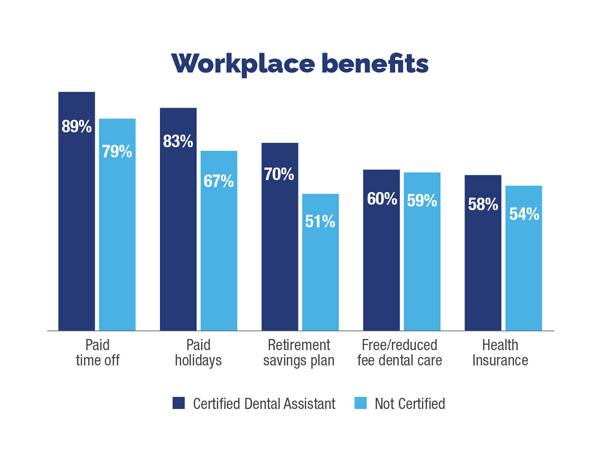5 ways certification jump-starts newer dental assistants’ careers

Dental assisting is an exciting and rewarding career path. But like any profession, you want to set yourself up for success with pay, workplace benefits, career growth, and more. According to DANB’s 2024 Dental Assistants Salary and Satisfaction Survey, Certified Dental Assistant (CDA) certification can have a significant impact on all dental assistants, but especially those who are newer to the profession.
Here are a few ways certification can help jump-start newer dental assistants’ careers.
Higher earnings
Certified Dental Assistants earned a median hourly pay of $26 per hour, compared to $22.50 for dental assistants who are not certified. That’s a 15% difference!
But the difference in pay is especially noteworthy for newer dental assistants. CDA certificants with 1-2 years of experience make over $5,000 more per year than non-certified assistants, earning a median of $23 per hour.
Dental assistants who earn higher wages are more likely to report high job satisfaction. Securing fair compensation can also provide career longevity — higher pay was the biggest factor in dental assistants staying in the profession. Among all dental assistants, the difference between feeling fairly compensated and not is $4 per hour.
“I chose to earn and pursue CDA certification for many reasons, such as professional growth, better job opportunities, and increased pay, but also because it is very important to me!” says Enid Santos, CDA.
More benefits
Workplace benefits — such as paid time off, paid holidays, retirement savings plan, and health and dental insurance — play a critical role in job satisfaction. Forty percent of dental assistants said more benefits would encourage them to stay in the field longer.
The good news is Certified Dental Assistants are more likely to receive workplace benefits. For instance, 89% of CDAs receive paid time off compared to 79% of dental assistants who are not certified.
Every dental assistant will have different priorities in terms of benefits, but holding CDA certification can help secure a more competitive benefits package.

New career opportunities
Being hired as a dental assistant is an impressive achievement, and CDA certification can provide additional avenues for advancement and higher wages. CDAs are more likely to be leaders in the office and take on new roles, and they’re more likely to stay in the field when they receive career growth opportunities.
These roles could include lead dental assistant, restorative functions, infection control coordinator, expanded functions, and more. By taking on additional responsibilities, these dental assistants often receive a pay increase, especially among CDAs. For instance, Certified Dental Assistants who are lead dental assistants reported earning a median of $27 per hour, which is $2 per hour more than lead dental assistants who are not certified.
In addition to new roles within the clinic, Certified Dental Assistants are more likely to be office managers or educators. While these positions aren’t chairside, the skill and knowledge these CDAs possess can translate to other areas of dentistry.
“With my CDA certification, I was able to get a job as a dental assisting instructor, and now I love to teach. I’ve been teaching for seven years, and my CDA has opened doors to new opportunities, like education,” says Stephanie De Leon, CDA.
Increased job satisfaction
About 2 out of 3 dental assistants are satisfied or very satisfied with their current job. According to the survey, satisfaction was higher among Certified Dental Assistants (65%) than dental assistants who are not certified (55%).
Dental assistants with 1-2 years of experience reported high or very high levels of satisfaction. As newer dental assistants think about their future, certification provides opportunities for higher pay, career growth, and other factors that can make dental assisting a rewarding career for years to come.
High personal achievement
Starting a new career path may feel daunting, but CDA certification helps newer dental assistants demonstrate their knowledge and skills, resulting in increased pride and confidence. Holding CDA certification can also help dental assistants stand out from the crowd when applying for jobs or earning a promotion.
“CDA certification shows a commitment to the field and to keep learning. The dental field is always changing and growing; it’s exciting to change with it,” says Jennifer Prather, CDA.

